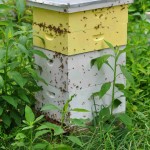A National Public Radio broadcast recently discussed the freezing of honey bee embryos in North Dakota. The goal of projects like this is similar to seed banks, preserving genetic material for the long term. See: http://www.mprnews.org/story/2016/02/08/honey-bee-sperm-bank-research-fargo.
There has been a lot of work in the freezing of honey bee semen (sperm) in recent years, they are going beyond that work in North Dakota. Why North Dakota? North Dakota is one of the biggest honey producing areas of the United States. I have attended beekeeper meetings in North Dakota that don’t attract a lot of beekeepers, maybe 40, but these beekeepers together own a quarter of a million hives. I once had a beekeeper from there tell me that he was just a small beekeeper, he only owned 2,000 hives!
A great deal of work in freezing honey bee semen has been done at Washington State University. See the below links for more about what they are up to at WSU.
http://articles.extension.org/pages/62802/honey-bee-genetic-diversity-and-breeding:-towards-the-reintroduction-of-european-germplasm
https://news.wsu.edu/2013/06/06/wsu-researchers-preparing-bee-semen-bank/

